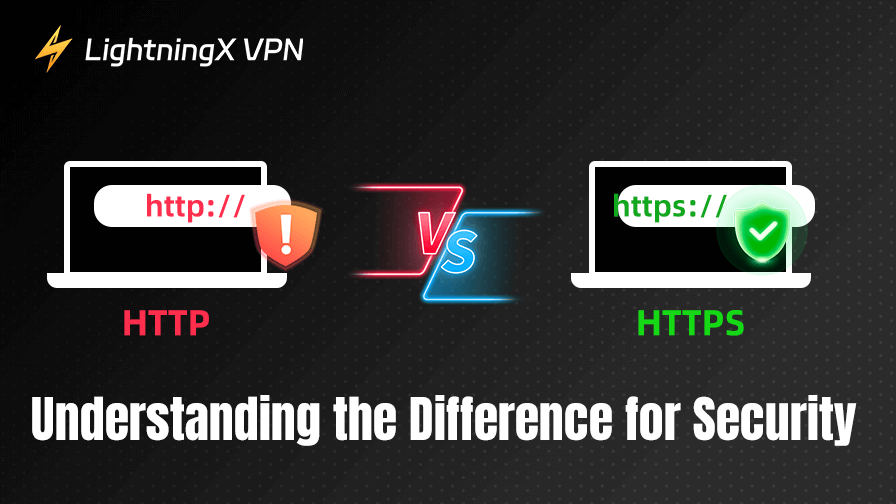Online security is now highly required. The website address we often visit may begin with HTTP or HTTPS. The protection of your data has changed significantly, as indicated by the little “S”.
This post explores HTTP and HTTPS, along with their advantages, disadvantages, and the importance of SSL certificates for website security.
What Is HTTP and How It Works
The Hyper Text Transfer Protocol (HTTP) is the foundation of data communication on the web. It defines how information is requested and delivered between your web browser, such as Chrome, and a website’s server.
When you type a website address starting with “http://” and hit enter, your browser sends a request to the site’s server. The requested resources, including text, photos, videos, and other material, are subsequently sent back by the server to be shown on your screen.
HTTP is designed to be fast and straightforward, which makes it easy for websites to load quickly. However, one major drawback is that HTTP does not encrypt data during transmission.
This implies that any transferred data, including payment information, login credentials, and personal information, may be intercepted by hackers, particularly when utilizing unprotected public Wi-Fi.
Because of this lack of encryption, HTTP is now considered less secure than its modern counterpart, HTTPS, which adds an extra layer of protection through SSL(Secure Sockets Layer)/TLS(Transport Layer Security) encryption.

Risks of Using HTTP:
- Data interception: Attackers may intercept any sent data.
- Identity theft: Personal information can be taken and used improperly.
- Man-in-the-middle attacks: Hackers can intercept or change data while it is in transit
Because of these weaknesses, HTTP is not ideal for sites that handle confidential information.
Related: What Is “HTTP Error 500”? 5 Ways to Fix It
What Is HTTPS and Why Does It Improve Website Security
HTTPS stands for Hypertext Transfer Protocol Secure, which is the secure version of HTTP. It uses SSL/TLS certificates to encrypt the data transferred between a browser and a website’s server, preventing unauthorized access or tampering. HTTPS offers three key benefits:
- Encryption: All data is scrambled, making it unreadable to anyone who might intercept it.
- Authentication: Confirms the website is genuine and not an imposter site trying to steal information.
- Data Integrity: Ensures that the data sent or received is not altered during transmission.
This added security is especially important for sites handling sensitive information, such as online banking, e-commerce stores, and login pages. Today, most browsers also mark non-HTTPS sites as “Not Secure”, encouraging website owners to adopt HTTPS.

How HTTPS Works:
1. SSL Handshake and Verification: The browser verifies the validity of the website’s SSL certificate.
2. Exchange of Encryption Keys: All transmitted data is encrypted using a secure key that is generated.
3. Secure Communication: All communications between the browser and the server are secured by encryption.
This process is instantaneous and has no discernible impact on website speed.
Why SSL Certificates Are Critical for Website Security
An SSL certificate is a digital certificate that permits HTTPS encryption and verifies the legitimacy of a website. SSL certifications are necessary for:
- Protecting Sensitive Data: Makes sure emails, passwords, and other private information are safe.
- Gaining the Trust of Visitors: People know that a secure website is represented by the padlock icon.
- Regulatory Compliance: Many laws and regulations require encrypted connections to protect user data.
- Preventing Attacks: SSL certificates help defend against man-in-the-middle attacks and other threats.
A website can communicate dependability and security to users in addition to encrypting data by installing an SSL certificate.
HTTP vs. HTTPS: Key Differences and Security Benefits
Users and website owners can make safer decisions by being aware of HTTP vs. HTTPS.
- Data protection: HTTPS encrypts all data to avoid interception, whereas HTTP sends data in plain text.
- User Trust: While HTTPS shows a padlock, modern browsers mark HTTP sites as “Not Secure”, fostering confidence.
- Website security: Using HTTPS and a valid SSL certificate guarantees that your website is safe from frequent intrusions.
- Performance: HTTPS websites can load more quickly than HTTP sites thanks to HTTP/2.
Common Misconceptions About HTTP vs. HTTPS
- HTTPS Slows Down My Website: HTTPS is quick and effective thanks to modern technologies like HTTP/2.
- Only Online Stores Need HTTPS: HTTPS is beneficial for any website that allows for user interaction.
- HTTPS is Expensive: Actually, there are many free SSL certificates available.
Your website is vulnerable to data theft, browser warnings, decreased trust, and possible blocking if it stays on HTTP.
How to Upgrade from HTTP to HTTPS
If you want to keep your website secure, you must switch from HTTP to HTTPS. Among the steps are:
- Obtain an SSL Certificate: Get a free certificate from Let’s Encrypt or buy one from a reliable supplier.
- Install the Certificate: This is usually accomplished via the control panel of the hosting company.
- Update Internal Links: To prevent problems with mixed material, change all URLs from http:// to https://.
- Set Up 301 Redirects: Make sure the HTTPS version is automatically forwarded for all traffic.
- Test the Site: Confirm that resources are delivered securely and that all pages load as intended.
Tip: If you simply want to make your online data more secure and leave no traces, you can try LightningX VPN.
- It uses encryption protocols such as Shadowsocks, Vless, and WireGuard, along with powerful encryption algorithms like AES-256-GCM and ChaCha20-Poly1305, ensuring that your data remains unintercepted and unreadable during transmission.
- It is also compatible with multiple platforms, including Windows/ macOS/ Android/ iOS/ TV/ Linux/Chrome/Firefox/Edge. A single account can be logged in and used on multiple devices.
- You can unlock global content, including a wealth of streaming resources such as TikTok and Netflix, as well as popular social media platforms like Instagram, Twitter, and Facebook, with only one click.

The Future of HTTP vs. HTTPS
Universal encryption is becoming the norm on the internet. HTTP-based public websites are becoming less common. Encrypted communication is currently the norm for secure online interactions since the majority of browsers and platforms require HTTPS for effective operation. Only internal or private testing environments may continue to use HTTP.
FAQ – HTTP vs. HTTPS
1. Which is better, HTTP or HTTPS?
HTTPS is better because it encrypts data, protects user privacy, and improves security. Search engines also favor HTTPS websites in rankings.
2. Why is HTTP still used?
HTTP is still used for simple, static, or internal sites where security is less critical. Some older systems and legacy devices also rely on it.
3. Why is HTTP faster than HTTPS?
HTTP can be slightly faster because it doesn’t require encryption or decryption. However, modern HTTPS optimizations (like HTTP/2) often make HTTPS equally fast or faster in real-world use.
4. Is HTTP outdated?
Yes. While not completely gone, HTTP is considered outdated for public websites. Most browsers now label HTTP as “Not Secure,” and HTTPS has become the modern standard.
Bottom Line
Although HTTP and HTTPS appear to be similar, they differ greatly in their effects. Data encryption, authentication, and general website security are guaranteed by HTTPS with an SSL certificate. Any website that prioritizes long-term accessibility, safety, and trust must upgrade to HTTPS.















